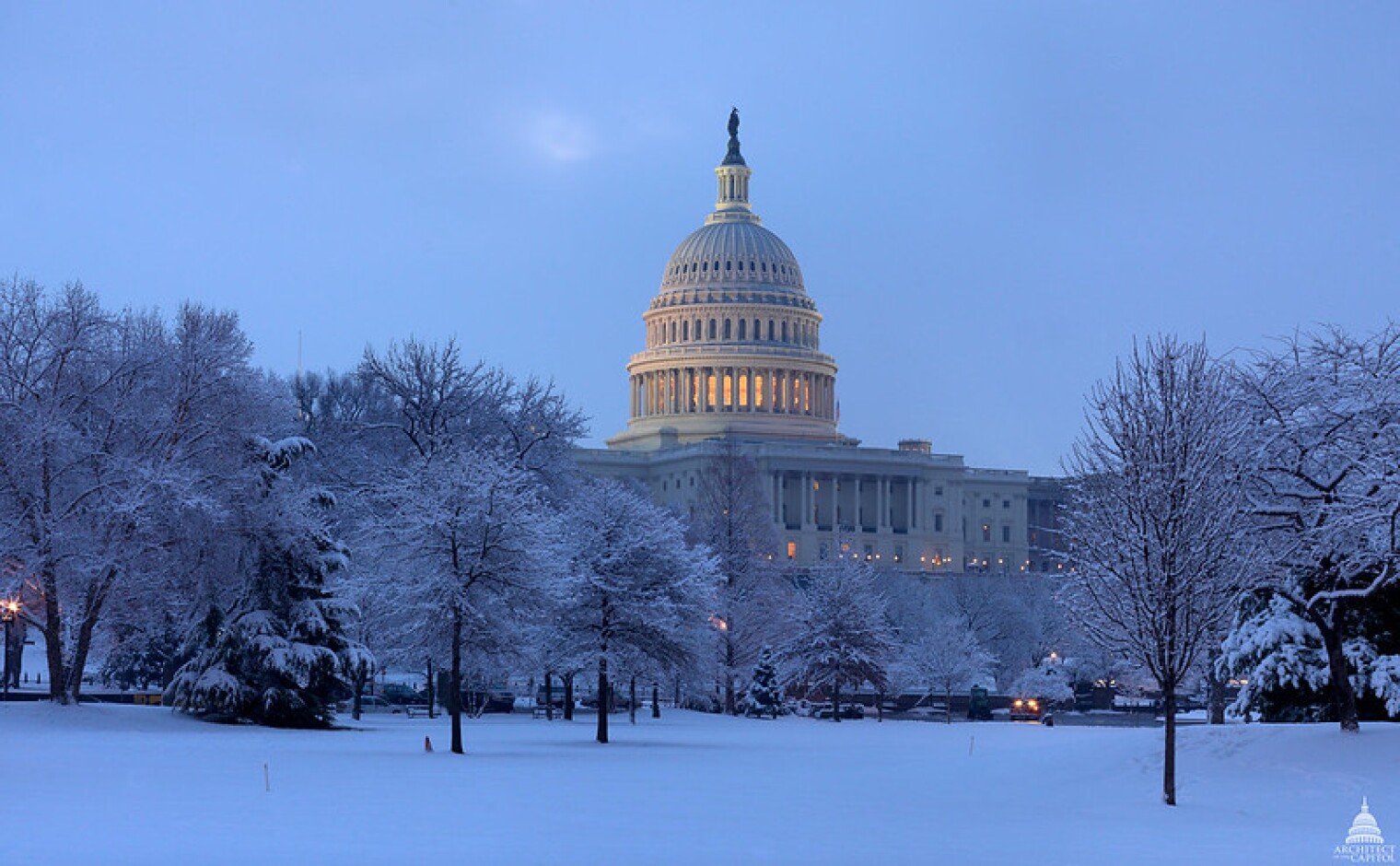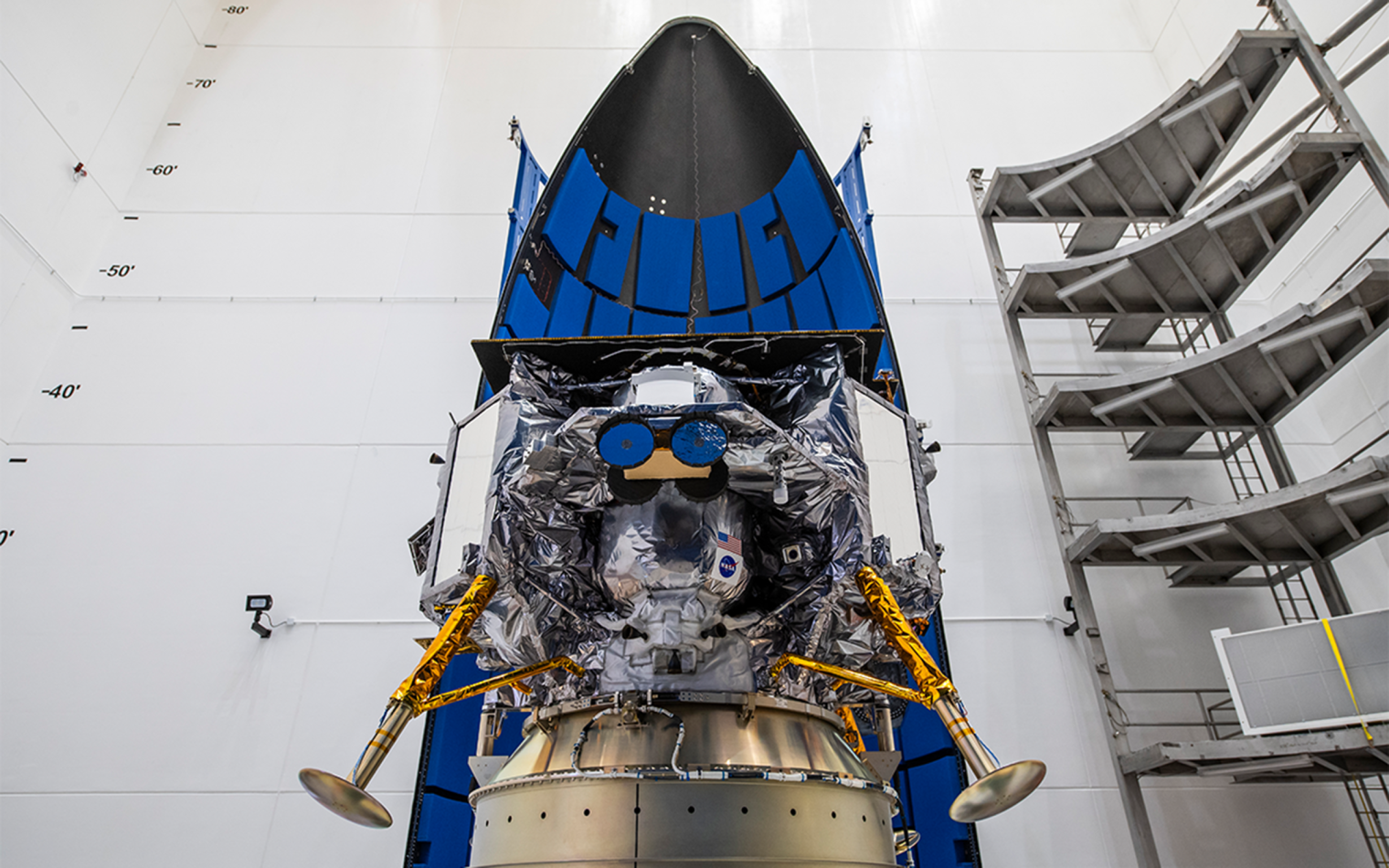| |
| FYI: Science Policy News from AIP |
| THIS WEEK |
|
|
|
|
|
|
| What’s Ahead |
 |
| The U.S. Capitol building in winter. (Architect of the Capitol) |
Congress Seeks to Extend Budget Stopgap to March
With funding set to expire on Friday for a group of federal agencies, congressional leaders are aiming to pass another stopgap spending bill this week to buy time to finish appropriations for fiscal year 2024. The Senate is advancing legislation that would extend funding at current levels for some agencies through March 1 and the remainder through March 8, preserving the split-deadline structure of the current stopgap. After the Senate acts, the House will attempt to pass the legislation under an expedited procedure that requires a two-thirds majority vote. Meanwhile, appropriators face the more difficult task of agreeing on agency-level allocations from the topline spending levels agreed to by party leaders earlier this month. Some hardline Republicans in the House have balked at the deal for maintaining non-defense funding at about current levels, clouding the outlook for a final agreement. The continuing uncertainty over what the final appropriation will be for the fiscal year has had growing effects on science agencies. Among the starkest examples, earlier this month NASA’s Jet Propulsion Lab laid off 100 contractors working on the Mars Sample Return mission because the House and Senate have proposed vastly different funding levels for the project.
Top Tax Lawmakers Propose to Strengthen R&D Tax Credit
Legislation that would strengthen both the R&D tax credit and the child tax credit was announced on Tuesday by the chairs of the House and Senate tax policy committees, Rep. Jason Smith (R-MO) and Sen. Ron Wyden (D-OR). According to a summary document, the legislation would permit expenses on R&D conducted in the U.S. between the end of 2021 and start of 2026 to be immediately deducted rather than amortized over a five-year period. This change would partially negate a provision of the 2017 tax reform law that weakened the R&D tax credit by requiring the amortization over five years. The legislation has not yet been introduced but will be called the Tax Relief for American Families and Workers Act of 2024. The level of support for the legislation is not yet clear. Notably, the top Democrat on the House tax committee and the top Republican on the Senate tax committee have not come out in support of the legislation.
House to Examine New Artemis Lunar Campaign Delay
The House Science Committee will hold a hearing Wednesday regarding NASA’s delay of the next launches in its Artemis campaign to resume human exploration of the Moon. NASA announced the delay last week, citing unexpected challenges with the missions’ heat shield, life support, and launch abort system. The Artemis II mission, which will orbit a crew around the moon, is pushed back from the end of 2024 to September 2025; that delay pushes back Artemis III, the first crewed landing of the campaign, from late 2025 to September 2026. Witnesses for the hearing include Catherine Koerner, the recently appointed head of NASA’s Exploration Systems Development Directorate; George Scott, NASA’s acting inspector general; and William Russell, director of contracting and national security acquisitions at the Government Accountability Office. A GAO report in November concluded that the Artemis III landing will likely not occur until 2027, and NASA’s Office of Inspector General has produced several reports drawing attention to challenges facing the Artemis campaign. Also testifying is Michael Griffin, NASA administrator under President George W. Bush, who has advocated for pursuing an aggressive timetable for returning humans to the Moon.
PCAST Weighs in on Emissions Reduction, Cyber Resilience
The President’s Council of Advisors on Science and Technology will meet on Thursday to vote on a report it prepared with recommendations for reducing greenhouse gas emissions. It will also vote to approve a report on ways to improve the cyber-physical resilience of U.S. infrastructure. After their approval, the reports will be transmitted to the president. Other topics PCAST has weighed in on to date include extreme weather resilience, wildfire preparedness, nanotechnology, biomanufacturing, semiconductors, and public engagement with the sciences.
|
|
| In Case You Missed It |
 |
| Astrobotic’s Peregrine spacecraft. (Astrobotic) |
Peregrine Lunar Lander to Burn Up in Earth’s Atmosphere
Astrobotic’s Peregrine spacecraft is returning toward Earth and is expected to burn up in the atmosphere on Thursday, after a propellant leak following its launch last week prevented it from landing on the Moon. Astrobotic is claiming partial successes in that the vessel made it to lunar-orbit distance and maintained communication with Earth during the journey. Peregrine is the first in a series of lunar landers built by companies with support from NASA’s Commercial Lunar Payload Services program. On the lunar surface, Peregrine would have deployed science experiments and served as a relay for communications and telemetry. It also carried personal items and human remains that customers paid to have delivered to the Moon. Astrobotic will host a teleconference with NASA on Thursday to mark the end of the mission.
NSF Promotes ‘Responsible’ Technology with New Ethics Program
The National Science Foundation launched a $16 million program last week that aims to “ensure ethical, legal, community, and societal considerations are embedded in the lifecycle of technology’s creation and use.” Called ReDDDoT (Responsible Design, Development, and Deployment of Technologies), the program will fund research, training, and community engagement with an initial focus on artificial intelligence, biotechnology, and disaster prevention and mitigation. NSF stated that it may later extend the program to cover other priority technologies identified in the CHIPS and Science Act. An informational webinar about the program will occur on Feb. 9.
DOE Rolls Out HALEU Supply Program
The Department of Energy began accepting proposals last week for uranium enrichment services to help the U.S. establish a reliable domestic supply of high-assay low-enriched uranium (HALEU), which is fuel that can be composed of up to 20% of the highly fissile U-235 isotope. HALEU fuel is key to many prospective advanced reactors, yet it is not currently available commercially from any U.S. suppliers. DOE plans to spend up to $500 million from the Inflation Reduction Act for HALEU enrichment contracts selected through this request for proposals and an earlier one focused on creating fuel suitable for advanced reactors.
NOAA Establishing Fire Weather Testbed
The National Oceanic and Atmospheric Administration announced last week that it has allocated more than $34 million to wildfire research, detection, and response projects, including a new Fire Weather Testbed. NOAA’s testbeds provide a proving ground for technologies and aim to accelerate their operationalization. The funding comes from the Infrastructure Investment and Jobs Act of 2021, which in total allocated NOAA $100 million for wildfire research and wildfire infrastructure.
DOD Industrial Strategy Spotlights STEM Workforce Needs, Alliances
The Department of Defense released its first-ever National Defense Industrial Strategy last week, which will guide its engagement, policy development, and spending strategies over the next three to five years. The importance of building a workforce with manufacturing and STEM skills is emphasized in the report, with the department outlining plans to further partner with educational institutions and expand research programs at HBCUs and minority-serving institutions. Additionally, the report outlines plans to fortify existing international science and technology alliances in collaboration with the State Department and Commerce Department, as well as create mechanisms for sharing knowledge with other partners and allies.
New Biotech Commission Issues Interim Report
The National Security Commission on Emerging Biotechnology published an interim report last month, outlining its initial policy recommendations for the U.S. to advance its domestic biotechnology industry and use advances in biotechnology to boost national security and economic competitiveness. The report warns that, without action, the U.S. will fall behind China in biotechnology. In addition to urging greater investment in biotechnology R&D, the commission proposes new legislation to improve coordination between the Department of Agriculture and national security agencies through the creation of a senior adviser for national security within the USDA. It also proposes the creation of an interagency Biotechnology Oversight Coordination Committee by the White House’s Office of Science and Technology Policy and Office of Management and Budget. Congress chartered the commission, modeling it on the National Security Commission on AI. The 12-member commission is chaired by Ginkgo Bioworks CEO Jason Kelly and includes Sens. Alex Padilla (D-CA) and Todd Young (R-IN) and Reps. Stephanie Bice (R-OK) and Ro Khanna (D-CA). Also among the members is Eric Schmidt, who co-chaired the NSCAI.
|
|
| Upcoming Events |
All events are Eastern Time, unless otherwise noted. Listings do not imply endorsement. Events beyond this week are listed on our website.
Monday, January 15
Martin Luther King Jr. Day
Tuesday, January 16
Wednesday, January 17
Thursday, January 18
Friday, January 19
Monday, January 22
Know of an upcoming science policy event either inside or outside the Beltway? Email us at fyi@aip.org.
|
|
| Opportunities |
|
Deadlines indicated in parentheses.
Job Openings
Solicitations
Know of an opportunity for scientists to engage in science policy? Email us at fyi@aip.org.
|
|
| Around the Web |
|
News and views currently in circulation. Links do not imply endorsement.
White House
Congress
Science, Society, and the Economy
Education and Workforce
Research Management
Labs and Facilities
Computing and Communications
Space
Weather, Climate, and Environment
Energy
Defense
Biomedical
International Affairs
|
|
|
| |
| This message is sent to you because you signed up for one of our newsletters. To manage your AIP email preferences and newsletter subscriptions ( add or remove ), please click here. Or to automatically unsubscribe from all AIP emails, click here. As a 501(c)(3) non-profit, AIP is a federation that advances the success of our Member Societies and an institute that engages in research and analysis to empower positive change in the physical sciences. The mission of AIP (American Institute of Physics) is to advance, promote, and serve the physical sciences for the benefit of humanity. |
|
| © 2025 American Institute of Physics. |
AIP, 1 Physics Ellipse, College Park MD 20740-3841
301.209.3100 - newsletters@aipcomm.org |
|
|